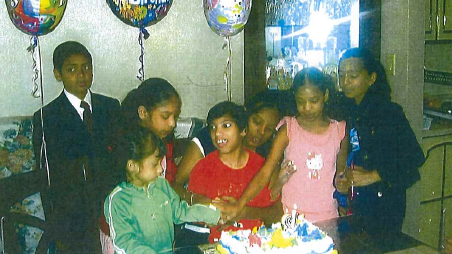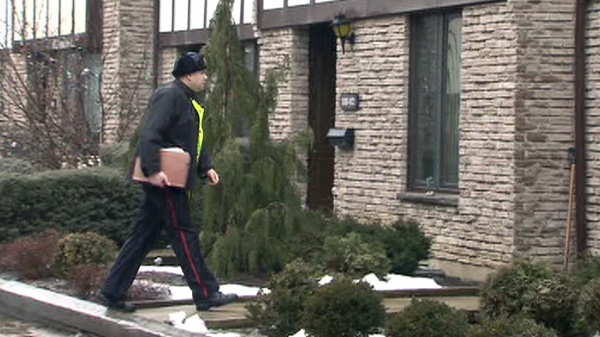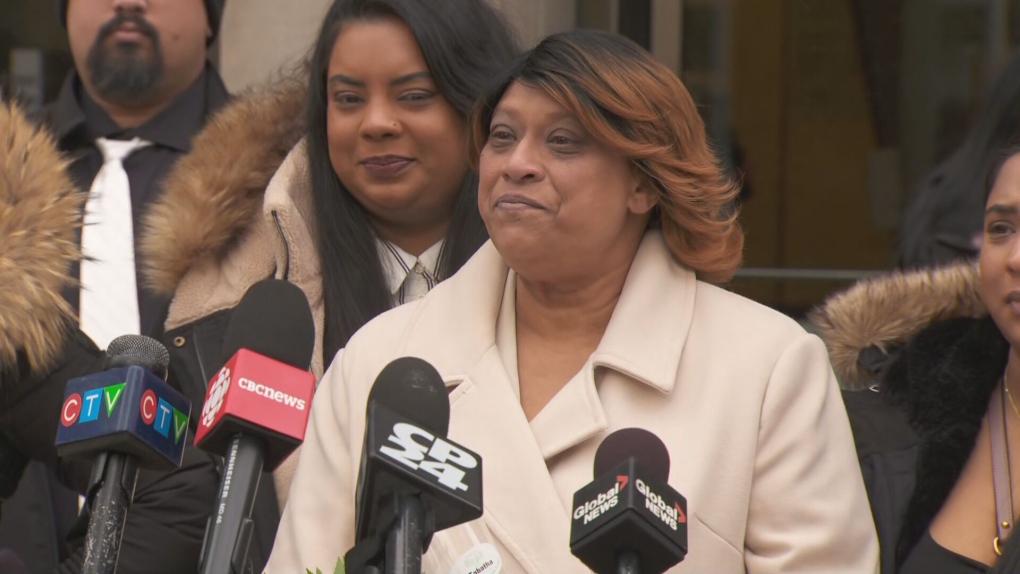Toronto mother acquitted in death of disabled daughter launches $10.5-million lawsuit against police, city
 Cindy Ali speaks to the media after being acquitted of a first-degree murder charge laid on her in 2012 in connection with the death of her 16-year-old daughter, Cynara. (Abby O'Brien)
Cindy Ali speaks to the media after being acquitted of a first-degree murder charge laid on her in 2012 in connection with the death of her 16-year-old daughter, Cynara. (Abby O'Brien)
Cindy Ali, the Toronto mother who was acquitted in the 2011 death of her 16-year-old daughter Cynara after serving more than four years in prison, is suing Toronto police and the city for more than $10 million.
In a statement of claim filed at the Ontario Superior Court of Justice in August, Ali and her husband, Allan, allege that the defendants were “negligent” in their investigation into Cynara’s death, which resulted in Ali’s “false imprisonment” in 2016.
“This action arises from the defendants’ determination to convict Cindy of first-degree murder for the tragic 2011 death of her daughter, Cynara,” the lawsuit reads.
The lead investigator on the case, Frank Skubic, and a responding firefighter at the scene, Semahj Bujokas, are also listed as defendants, alongside the Toronto Police Services Board and the City of Toronto.
The suit alleges that the defendants owed the parents a duty of care, which they failed to meet following the death of Cynara, who lived with a severe form of cerebral palsy and suffered from life-threatening seizures.
Statements of defence have not been filed and the allegations have not been tested in court.
The Toronto Police Services Board and City of Toronto both said they couldn’t comment on the matter as it’s before the courts. In a statement to CTV News Toronto, Kevin McGiveney, who said he has been retained as counsel for all the defendants in this case, said the allegations will “certainly be defended.”
The 911 call
On the morning of Feb. 19, 2011, Ali said she called 911 and reported that two men had broken into her Scarborough townhouse looking for a “package.” She and Cynara were home alone together at the time.
She told police one man led her through the house searching for the item, and when they returned to the living room, Cynara was lifeless on the couch, with the other man standing nearby, holding a pillow. The men left, claiming they had the wrong house, and were never found.
First responders found Cynara without vital signs in the home shortly after. She was resuscitated and brought to the hospital, where she later died.
 Cynara Ali can be seen above sitting in front of a birthday cake. (Exhibit: Superior Court of Justice)
Cynara Ali can be seen above sitting in front of a birthday cake. (Exhibit: Superior Court of Justice)
Bujokas was the first person to arrive at the house that morning and testified, both in the 2016 trial and 2023 retrial, that he hadn’t observed footprints leading up to the home on the day of the call, despite a light snowfall earlier that day.
“This evidence suggested that Cindy’s report of a home invasion, in the absence of footprints in the snow, had to be false,” the statement of claim reads.
In a recording of the 911 call played at court, Bujokas was heard telling Ali, “There are no footprints, don’t bulls--t me.” After briefly assessing her for injuries, Bujokas kicked Ali and told her to “get up,” according to both his and Cindy’s testimonies.
The investigation
Skubic was the lead detective on the case and the claim alleges that he “quickly developed” what would become the Toronto Police Service’s working theory: that Cindy made up the home invasion story to “cover up” her involvement in Cynara’s death.
“Officers took little care to secure the scene in the hours following the event, and the forensic team neglected to take fingerprint or DNA samples from several surfaces that Cindy said the home invaders touched,” the claim reads.
In November 2011, police launched Project Litoria, which included the execution of court-authorized search warrants on the Ali's home, the interception of phone calls made by more than a dozen members of people connected to the family, and a “fake,” all-expenses paid trip to Niagara Falls for the Alis, when police entered their home and installed “probes” to monitor the family.
 Police canvas the Ali's Scarborough townhouse complex in the aftermath of Cynara Ali's death, in March 2011 (CTV News)
Police canvas the Ali's Scarborough townhouse complex in the aftermath of Cynara Ali's death, in March 2011 (CTV News)
The claim stats that despite the investigation’s failure to produce “any incriminating evidence,” Ali was arrested on March 8, 2012 and charged with manslaughter. The charge was later upgraded to first-degree murder on Oct. 17, 2012.
The trial and retrial
Ali's case went to trial in January 2016, more than three years after she was charged.
The Crown argued that Cynara had grown too heavy a burden on the family and that Ali smothered her and staged the home to look like a break-in had occurred.
Ali rebuffed the accusation and maintained that her house was broken into, arguing that Cynara was never a burden to the family. A jury deliberated for less than 10 hours and convicted Ali of first-degree murder, handing her a life sentence with no chance of parole.
Ali was imprisoned at the Grand Valley Institution in Kitchener after her conviction and, according to the claim, she made two suicide attempts before she was transferred to the Pinel Psychiatric Institute in Montreal. When her mental health improved, she was transferred back Grand Valley.
The mother of three living children appealed the first-degree murder conviction immediately after the verdict was handed down and on April 20, 2020 she was granted bail.
She spent 49 months in prison.
Ali won the appeal on May 28, 2021, based on the argument that the instructions given to the jury had been too narrow. Her conviction was overturned and Ontario's highest court granted a new, judge-alone trial, the proceedings of which began on Oct. 16, 2023.
Ali was acquitted of first-degree murder on Jan. 19 and, according to the statement of claim, for the first time in the 13 years since Cynara’s funeral, Ali, her husband, and three daughters, visited her grave as a family.
 Cindy Ali speaks with reporters outside a Toronto courthouse on Friday after being acquitted in the 2011 death of her disabled daughter.
Cindy Ali speaks with reporters outside a Toronto courthouse on Friday after being acquitted in the 2011 death of her disabled daughter.
“It’s been a really tough road for us,” Ali said following the acquittal. “Now, it’s time for my family to start healing and grieving.”
The suit is seeking damages in the amount of $8 million from the Toronto Police Services Board and Frank Skubic, $2 million from the City of Toronto and Bujokas, and an additional $500,000 from all defendants.
CTVNews.ca Top Stories

'She will not be missed': Trump on Freeland's departure from cabinet
As Canadians watched a day of considerable political turmoil for Prime Minister Justin Trudeau and his government given the sudden departure of Chrystia Freeland on Monday, it appears that U.S. president-elect Donald Trump was also watching it unfold.
Canadian government to make border security announcement today: sources
The federal government will make an announcement on new border security measures after question today, CTV News has learned.
Two employees charged in death of assisted care resident who ended up locked outside building overnight
Two employees at an Oshawa assisted living facility are facing charges in connection with the death of a resident who wandered outside the building during the winter and ended up locked outside all night.
The Canada Post strike is over, but it will take time to get back to normal, says spokesperson
Canada Post workers are back on the job after a gruelling four-week strike that halted deliveries across the country, but it could take time before operations are back to normal.
Lion Electric to file for creditor protection
Lion Electric, a Quebec-based manufacturer of electric buses and trucks, says that it plans to file for creditor protection.
Canada's inflation rate down a tick to 1.9% in November
Inflation edged down slightly to 1.9 per cent in November as price growth continued to stabilize in Canada.
Transit riders work together to rescue scared cat from underneath TTC streetcar
A group of TTC riders banded together to rescue a woman's cat from underneath a streetcar in downtown Toronto, saving one of its nine lives.
Trudeau considering his options as leader after Freeland quits cabinet, sources say
Chrystia Freeland, Canada's finance minister, said in an explosive letter published Monday morning that she will quit cabinet. Here's what happened on Monday, Dec. 16.
Teacher and a teenage student killed in a shooting at a Christian school in Wisconsin
A 15-year-old student killed a teacher and another teenager with a handgun Monday at a Christian school in Wisconsin, terrifying classmates including a second grader who made the 911 call that sent dozens of police officers rushing to the small school just a week before its Christmas break.

































